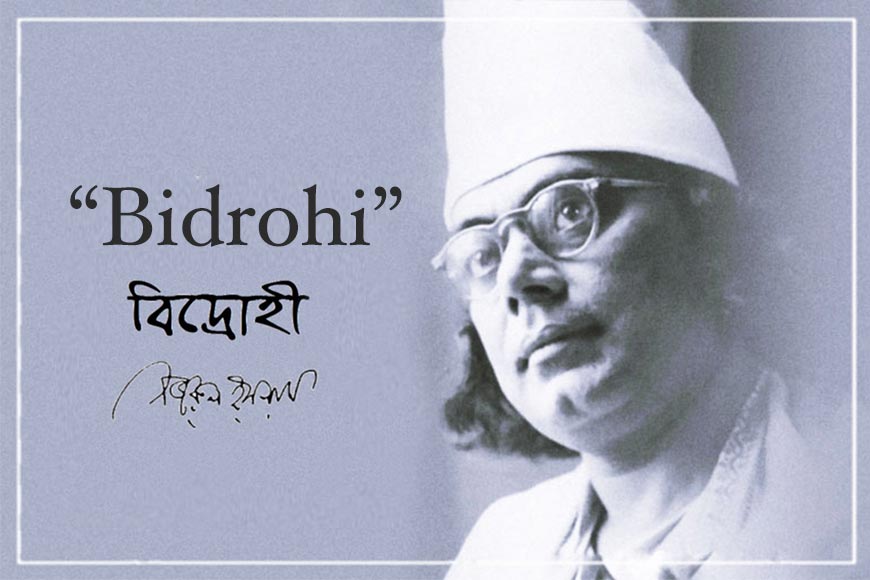Nazrul’s century-old ‘Bidrohi’ remains the voice of protest against injustice

On May 24, the world celebrated ‘Bidrohi Kobi’ (Rebel poet) Kazi Nazrul Islam’s 122nd birth anniversary. But what went unnoticed and unsung was the fact that his iconic poem ‘Bidrohi,’ that shot him to fame, is making its centenary this year. The poem is recognized as a landmark poetic marvel because of its radically transformative “modern” content, texture and style, something that took the Bengali literary world by storm.
‘Bidrohi’ was first published in ‘Bijli’ and later in other periodicals. It was included in ‘Agnibeena,’ the first anthology of Nazrul’s poems and published in 1922. ‘Bidrohi’ marked the amazing outbursts of Nazrul’s variegated moments of self-awakening — a moment of awakening that symbolised the collective outbursts of the nation as well. The initial critical reactions to ‘Bidrohi’ were quite interesting as they reflect the resurgent fall out of the text in colonial Bengal. It was viewed by contemporary readers not just as a poem, rather as an invigorating experience. ‘Bidrohi’ is a reminder of our school days. The poem has been an integral part of school syllabus. Nazrul’s defiance and assertive protest against all forms and forces of oppression around the world, has been inspiring youths even to this day. He writes:
Say, Valiant,
Say: High is my head!
Looking at my head
Is cast down the great Himalayan peak!
Say, Valiant,
Say: Ripping apart the wide sky of the universe,
Leaving behind the moon, the sun, the planets
and the stars
Piercing the earth and the heavens,
Pushing through Almighty’s sacred seat
Have I risen,
I, the perennial wonder of mother-earth!
The angry God shines on my forehead
Like some royal victory’s gorgeous emblem.
Nazrul joined the British Royal Army in 1917 at the age of 18 and was attached to the 49th Bengal Regiment. He was posted to the Karachi Cantonment, where he wrote his first prose and poetry. He left the army in 1920 when the 49th Bengal Regiment was disbanded and returned to Calcutta in March.
He joined the staff of Bangiya Mussalman Sahitya Samiti ("Bengali Muslim Literary Society") and continued his literary works. He was a prolific writer and wrote short stories, novels, poems and songs simultaneously. During this time, he changed residences several times in quick succession before settling down in a house on Taltola Lane where he befriended the legendary leader of Indian Communist movement, Muzaffar Ahmed (‘Kaka-Babu’ to his followers). Nazrul was given accommodation in a tiny room on the ground floor. Bengalis were yet to realize the immense literary potential of this ‘rebellious’ youth.
It was a chilly December night in 1921. The painful memories and wounds of World War I had still not healed. Muzaffar Ahmed’s books lay stacked in a corner of Nazrul’s room who was extremely busy, attending political meetings and delivering lectures. Nazrul watched him in silence. The Russian Revolution greatly impacted India and the socialist movement began to take form. Nazrul was also swayed by the Bolshevik Movement and on that very December night he wrote his magnum opus, ‘Bidrohi.’
I am the hurricane, I am the cyclone
I destroy all that I find along the path!
I am the dance-intoxicated rhythm,
I dance at my own pleasure,
I am the unfettered joy of life!
I am Hambeer, I am Chhayanata, I am Hindole,
I am ever restless,
I caper and dance as I move!
I do whatever appeals to me, whenever I like,
I embrace the enemy and wrestle with death,
I am mad. I am the tornado!
I am pestilence, the great fear,
I am the death of all reigns of terror,
I am full of a warm restlessness forever!
Say, Valiant,
Ever high is my head!
Nazrul was spewing fire with his pen, nee, pencil. He actually scribbled the poem on a piece of paper and the next day, he recited it out to his friend, Muzaffar. The next year it was published in three very highly rated literary magazines of the time namely Bijli, Probasi and Sadhona. In fact, Bijli’s circulation increased phenomenally after the poem was published. A poet was born. Bidrohi was unprecedented in its nation-wide impact. The insurgent uproar of anti-colonial struggle which inspired and agitated millions of Indians got its perfect articulation through the inflammatory versification of Bidrohi. It replicated the wild impatience of the youths agitating against colonial rule and all forms of social atrocities at that time. The poem took the entire province of Bengal by storm. The new and unique fury of Bidrohi had a massive impact on the youths of the country as they could identify themselves with its radical rebellious content. By now Nazrul was a name to reckon with.
In 1922, he began to edit a weekly, ‘Dhoomketu (The Comet). He spoke about revolution through his works and protested against all forms and forces of oppression around the world. The ‘rebel’ of Nazrul’s poem is the unending fanatic against grievance, incomprehension, and oppression, while the 'I' (Ami) is the defender of the marginalised. Hundred years later, apart from its historical significance, Bidrohi transcends borders of time, speaking for humanity aloud.
How do contemporary young Bengali poets assess ‘Bidrohi’? Poet Sanghamitra Haldar says, “This poem was written during a volatile period when the country’s socio-political unrest was growing to a crescendo. Nazrul explores the different forces at work in a rebel -- the destroyer, and the preserver who is able to express rage as well as beauty and sensitivity and these facets are universal, transcending the barriers of time. The importance of poetry in a person’s life may be a debatable topic but Bidrohi’s theme will keep on inspiring people for generations to come. It will continue to be the voice of the marginalized, the exploited proletariat class for centuries to come.”
Professor Priyobrata Ghosal is captivated by the layers of meaning he discovers every time he recites this poem. The dichotomy of the poem fascinates him.
I am creation, I am destruction,
I am habitation, I am the graveyard,
I am the end, the end of night!
I am the son of Indrani
With the moon in my head
And the sun on my temple
In one hand of mine is the tender flute
While in the other I hold the war bugle!
Who else but Nazrul, the Rebel could have written these bold, remorseless words so brazenly? But one shudders to think of the fate of any Muslim poet writing a bold poem like ‘Bidrohi’ in the 21st century. He would have probably been thrown behind bars on sedation charges or he would have been forced to leave the country for speaking the truth. Fortunately for us, a Nazrul was born among us who gave us Bidrohi, a voice, the weapon to protest against any wrongdoing and injustice.
(Translated by TTW)










